| In Town Tonight
It was a rare treat for me to be allowed into the inner sanctum of publishers Hodder in their impressive offices which dominate the border between Bloomsbury and Regent’s Park, overlooking the demilitarised zone that is the Euston Road. Using the glass-sided ‘bullet lift’ elevator to ascend to the Board Room was a thrill in itself, rather like visiting the villain’s lair in a Bond film, but instead of an awkward interrogation, I was confronted with the smiling faces of Hodder’s assembled crime writers all happy to talk about their forthcoming books.

I have to admit I was rather unprepared to ask anything meaningful about the new novel from my old chumette Sophie Hannah (pictured above, far right), which is out in April, as I had only just received a proof copy of The Telling Error that morning. Foolishly I had been expecting Sophie’s next book to be her eagerly-anticipated Hercule Poirot novel, but that does not appear until the Autumn (and from another publisher – as a Hodder executive pointed out to me rather sternly!)

I was, however, on safer ground with the charming Scottish writer Louise Welsh and London’s most fashionable bookseller David Hedley of Goldsboro Books.
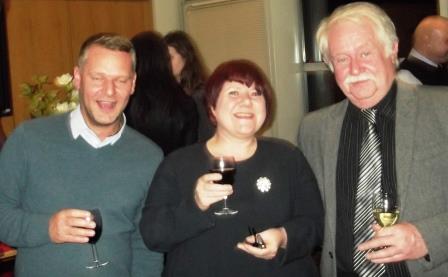
Louise is one of many notable crime writers appearing at the Essex Book Festival next month, to celebrate the publication of A Lovely Way to Burn (John Murray), the first novel in her planned ‘Plague Times’ trilogy which is set in a London ravaged by a pandemic, so cue a collapse of civilisation and end-of-the-world scenario where the odd murder might go unnoticed. Cheerfully, perhaps as only a Scot could, Louise admitted that she had long been fascinated by the idea of an apocalyptic ‘end of days’ – though since licensing law reform in the last century, I do not think this view is as widespread as it once was in Scotland.
One party I was unable to attend, at the aforementioned (and fashionable) Goldsboro Books, was that to mark the publication of Roger Morris’ new novel, The Dark Palace from Severn House.
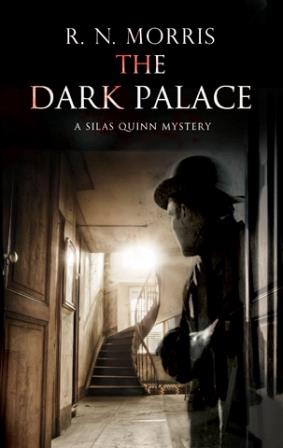
Set in April 1914, The Dark Palace is the third outing for Roger’s detective hero Silas Quinn, whom I once described as ‘an Edwardian Dirty Harry’, involved – as the title suggests – in crimes connected to the cinema and the latest (silent) film by an Austrian auteur.
Sadly, I am also unable to attend the launch party for the debut novel by Sarah Hilary, Someone Else’s Skin (Headline) later this month.
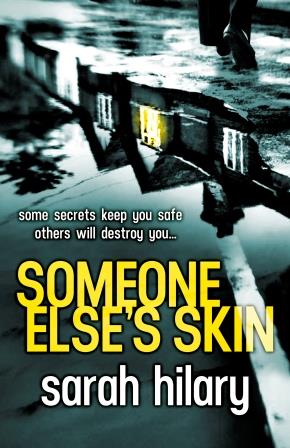
Confusingly, Amazon lists the book for publication in July although it already carries reviews of it from December 2013 and the launch party is to be held on 28th February in Foyles Bookshop, Cabot Circus, Bristol. Whenever the book appears officially, I wish it well but will not be at the party in Bristol.
I am already committed to attending Crimefest in May in Bristol and, like Bilbo Baggins, when one gets to an advanced age it is not wise to tempt fate by going into the West too often.
Bedside Manner
At one of my recent creative (crime) writing seminars, the subject of Richard III came up – as it often does – leading in turn to a discussion of Josephine Tey’s classic The Daughter of Time, which I am appalled to discover has still not been read by absolutely everybody.
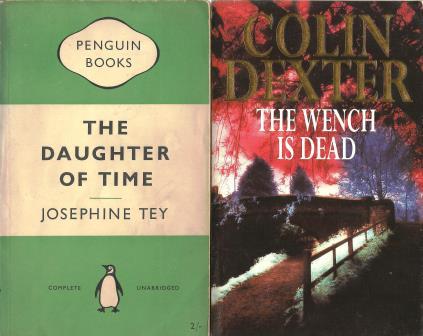
This in turn raised the topic of detectives solving crimes from their sickbeds, most famously Alan Grant in Tey’s 1951 masterpiece and then Inspector Morse in Colin Dexter’s The Wench Is Dead in 1989. And that, I assumed, just about exhausted my knowledge of detectives solving ‘cold cases’ without moving from under the duvet, until I discovered – thanks to Sergio Angelini’s always-entertaining blog Tipping My Fedora – that there was at least one more and no less a famous sleuth than Miss Jane Marple.
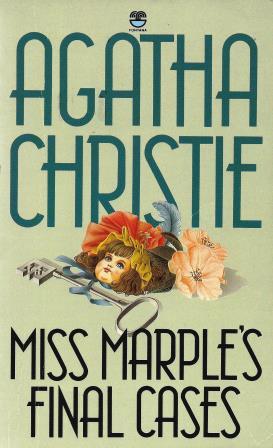
Agatha Christie had her famous detective confined to bed, recovering from a bad bout of ‘flu in the 1941 short story The Case of the Caretaker where her doctor prescribes a ‘mental tonic’ – the cold case of the title. Naturally, Miss Marple has to read through the documents of the case only once to come to the right conclusion: a slightly dim rich girl killed for her money by lounge-lizard new husband who turns out to be the most cack-handed murderer ever. Originally published in The Strand magazine, this is a typical ‘Mayhem Parva’ story thought to have formed the basis for Christie’s 1967 novel Endless Night which the late Robert Barnard (a Christie expert) described as “The best of the late Christies...A splendid late flowering” in A Talent To Deceive, his definitive appreciation of the Great Dame.
No sooner said…
No sooner had I mentioned, last month, that Barbara Nadel would be appearing at the Essex Book Festival in March than her new novel Body Count (Headline) popped through the letter-box here at Ripster Hall.
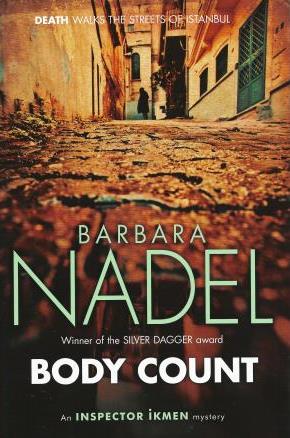
Fortunately, I had guessed correctly in assuming it would be another case (at times a very gruesome one) for Barbara’s popular Turkish detective, Inspector Ikmen of Istanbul, a series hero who has been called ‘the Morse of Istanbul’ though I am not sure Oxford was quite as bloody and brutal as this. (At least not outside the Upper Reading Room of the Bodleian Library.)
On the Ball, City…
I have always felt that the fine city of Norwich has never quite got its due in the annals of crime fiction and I can think of only one crime series set there – Sylvia Haymon’s Inspector Ben Jurnet novels (1980-96), for although the city in the books was called ‘Angleby’ is was very clearly Sylvia’s home town of Norwich.
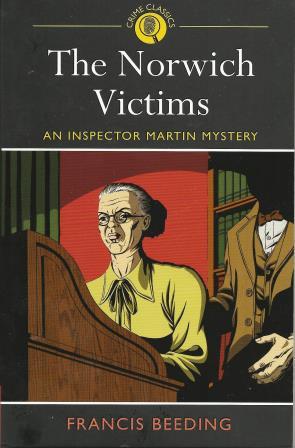
But now, thanks to the excellent republishing efforts of Arcturus Publishing and their Crime Classics series (remarkably priced at only £6.99) I have made a long-overdue appointment to read The Norwich Victims by ‘Francis Beeding’, first published in 1935.
I owe a debt of thanks to Arcturus for introducing me to the work of Francis Beeding a year or so ago when they republished Death Walks in Eastrepps, published four years before The Norwich Victims and set mostly in Cromer on the Norfolk coast, which I enjoyed immensely. Knowing nothing of ‘Francis Beeding’ I immediately turned to my much-thumbed British Crime Writing Encyclopedia (sic) only to find no mention of him. It turns out that he was in fact a ‘them’ as the pen-name Francis Beeding was used for some 30 novels between 1925 and 1946 by the duo Hilary St George Saunders (1898-1951) and John Palmer (1885-1944) who wrote both crime and spy fiction (and Saunders wrote many military/war themed books on his own). Little of their between-the-wars spy fiction – which is rumoured to have been quite good – survives but thankfully their crime fiction is better remembered (one of their books being the basis of the Hitchcock film Spellbound).
And who could resist a Golden Age mystery such as The Norwich Victims which actually starts with a photographic gallery of the main suspects, such as these unsavoury characters, or perhaps ‘victims’:
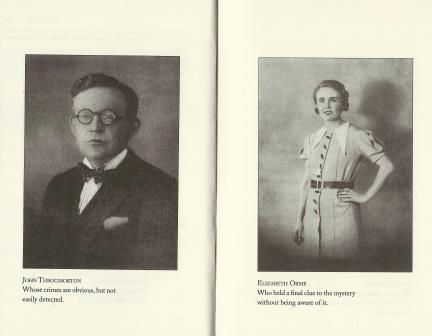
Small World
The books of Dorothy Cannell are not as well-known in Britain as perhaps they should be, even though many are traditional English ‘cosy’ mysteries, and she herself was born an Englishwoman. She is much better appreciated in America, where she has lived (with her husband, a colonial) for many years and where it comes as no surprise that she is to receive a Lifetime Achievement Award at this year’s Malice Domestic convention in Maryland.
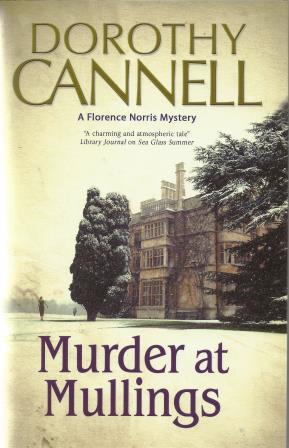
I am pleased, therefore to see her latest, Murder At Mullings, published here by the enterprising, yet always elegant, Severn House and the book is a timely reminder for me of how small – and friendly – the world of crime writing can be.
I met Dorothy Cannell once, in Oxford when she was attending the annual St Hilda’s crime conference (though naturally, for legal reasons, I was not) along with her (and my) great friend Margaret Maron from North Carolina. In one of those ‘six degrees of separation’ memes which does not include Kevin Bacon, I am delighted to note the acknowledgement in Murder At Mullings to Joe Maron, husband of Margaret, for inspiring part of the plot with tales of ‘ornamental hermits’ – one of whom takes up residence in the grounds of Mullings, the country house of the title.
I count Joe Maron, an artist and no mean brewer of fine beer, as an old and distinguished friend with whom I have swapped many tall tales, not the least on the occasion when we saw out tropical storm Alex (I insisted it was a hurricane) in an ocean front house on Harker’s Island on the Outer Banks. After a night of severe buffeting and with emergency rations of beer running dangerously low, we emerged intact the next morning to take breakfast on the porch and survey the considerable re-modelling of the beach done by the storm. To the local inhabitants, we probably looked like a couple of ornamental hermits.

Too Soon?
I know it is only February but I think I may have read the best crime novel of the year; certainly one of them.
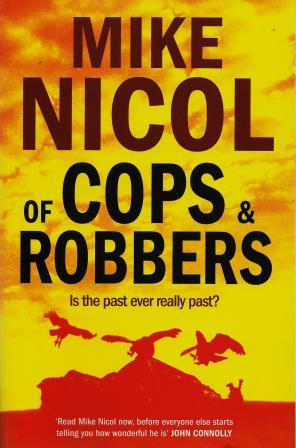
Mike Nicol’s Of Cops & Robbers (now out from Old Street Publishing) is an absolute belter. It has a setting – South Africa rife with corruption, drugs and death squads which makes most Scandi-crime look as if it’s been set in Legoland – a cool, surfer-dude private eye hero, a sexy lawyer (and poker addict) heroine, razor-wire plotting and cut-glass dialogue. Throw in some very dodgy business deals and a history of political assassinations (based on real events sadly) and this is a heady brew which motors along at a head-spinning pace.
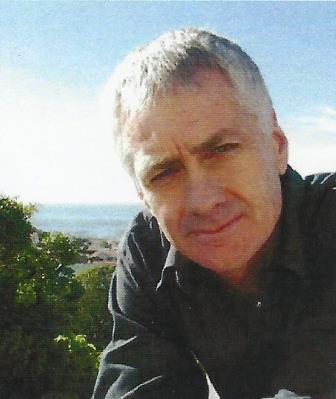
In the past I have flagged up Mike Nicol’s ‘Revenge Trilogy’ of books – Payback, Killer Country and Black Heart, and once compared him to American crime-master Robert Crais. On the evidence of this stand-alone thriller, I’d place him higher and though (for legal reasons) I rarely agree with anything said by that Irish imp John Connolly, I have to admit that his advice is absolutely sound when he advocates: “Read Mike Nicol now, before everyone else starts telling you how wonderful he is.”
In fact, John, this column first told its reader(s) how good Mike Nicol was in April 2010….
|
|
No sooner had I finished one excellent South African crime novel than I plunged into another by an author I myself was told (possibly in 2010) was really very good. As that recommendation came from my young apprentice, the talented Jake Kerridge, crime critic for that once-great newspaper the Daily Telegraph, I had to take it seriously.
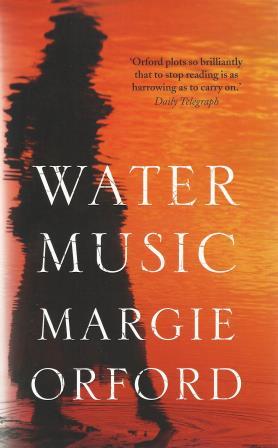
Water Music by Cape Town writer Margie Orford is out in March from Head of Zeus, who have also bought up her four previous thrillers featuring profiler Dr Clare Hart for reissue in paperback starting next year. I am already hooked – two pages before Chapter One – as the epigraph chosen by Margie Orford to introduce her novel is: “All torture is, in the end, directed at the spirit” which my more discerning readers will instantly recognise comes from Geoffrey Household’s classic Rogue Male. Ms Orford is clearly a person of some taste and learning.
Worth its weight?
Having recently had a historical novel rejected by a publisher because “it was too long” (or at least too long for that particular editor to read to the end), I permitted myself a wry smile when a proof copy of Natchez Burning by Greg Iles, published next month by HarperCollins, thumped on to the doormat.
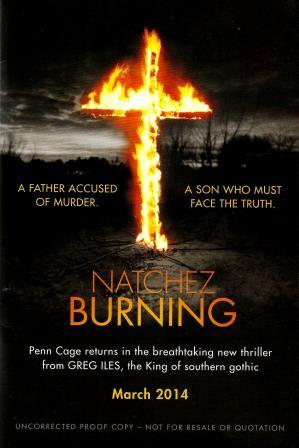
Somebody somewhere must like long books as this proof is 791 pages long and weighs in at two-and-a-quarter pounds, and the best news is it is the first part of a trilogy! One can only hope that Peter Jackson doesn’t acquire the film rights.
A Happy Birthday All Round
I was in a quandary as to what to get Len Deighton for his 85th birthday this month and in the end decided to get him nothing, but to treat myself to an almost pristine paperback edition of the guide book he edited in 1967: Len Deighton’s London Dossier, with its iconic ‘keyhole’ cover.
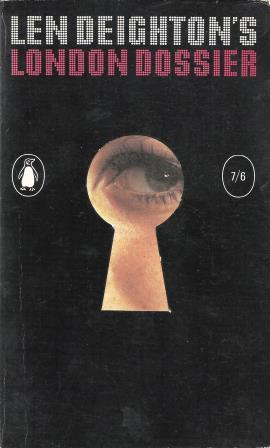
For anyone unfamiliar with this legendary piece of Sixties memorabilia – few of which survive intact because of the fragility of the keyhole cut into the cover – I can reveal that the face behind the eye looking through the keyhole is none other than fashion icon Twiggy, now of course the face of sensible Marks & Spencer rather than Swinging London.

Yet the Dossier is not actually a “yoof” guide (as we might say today) to the fashions of Carnaby Street, pop culture or the excesses of teenage rock ’n’ roll bands. Most of the contributors to this anthology are seasoned London hands of a previous generation, and their names probably don’t ring many bells these days, but Daniel Farson (a pioneer TV reporter and the great-nephew of Bram Stoker), Godfrey Smith (a journalist colleague of Ian Fleming and occasional crime writer), drama critic Milton Shulman and jazz pianist and presenter Steve Race, was a pretty impressive line-up at the time.
As a guide book 47 years on it is, of course, dated and some of its conclusions such as ‘Not even the most fervent Anglophile living could describe Britain’s telephone service as anything but appalling’ will baffle a generation of smart phone and WiFi users who think that telephone boxes are only used for travel in time and space.
On the other hand, as a historical/sociological document it is invaluable and its chapter on London’s pubs is still remarkably accurate, with the exception of the advice to foreign visitors that because there are ‘few places on earth’ where alcohol is so expensive, they should stick to beer. (Few in 1967, or even 2007, could have predicted the £5.50 a pint now charged in some London pubs.)
The beers recommended in the Dossier may have disappeared – long gone are Truman’s Burton Ale, Ind Coope Colne Spring Ale, Stingo, Dairymaid Stout and (hopefully) Double Diamond – but all the lovingly-described boozers, as far as I can tell, still thankfully exist, although The York Minster in Soho is now officially known as The French House and I fear that Weston’s Cider House on the Harrow Road succumbed to the trend of take-away pizzas and Chinese food in the 1970s.
I do hope Len enjoyed his birthday. I certainly enjoyed his present.
Into the Darkness
I am jolly excited to already be in possession of a proof copy of John Harvey’s new novel, which is not available to Muggles until May from Heinemann, and although labelled as ‘Resnick’s Last Case’ its actual title is Darkness, Darkness.
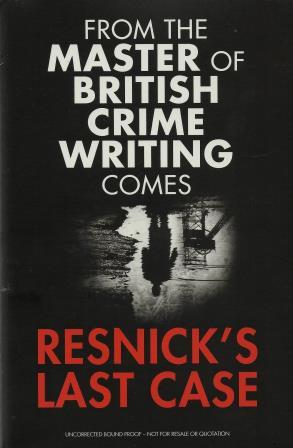
That title will resonate with anyone who remembers that we used to have coal mines and miners and the book harks back to those divisive and violent times thirty years ago when the industry and the country was rocked by the Miners’ Strike. (John Harvey was living in Nottingham at the time and saw the effects of the strike on the Nottinghamshire coalfields and its mining communities).
Known as a poet and a jazz fan as well as the author of some finely crafted crime novels, John Harvey is about to embark, courtesy of Nottinghamshire County Council, on what he described to me as “a magnificent three-library tour of the county under the heading Jazz is the Word” where, with the accompaniment of a four-piece jazz group, he will be reading poems about jazz music and musicians, together with extracts from his Resnick novels. If you are in the East Midlands in February you can catch John at Worksop on the 11th; Southwell, on the 12th; and West Bridgford, on the 13th. John is also due to appear at Crimefest in May, but whether he will have a jazz combo in tow I am not sure.
Upcoming
A whole host of thrillers all being heavily promoted by their publishers are about to descend in the next three months or so. I cannot hope to do justice to them all, but four in particular have caught my rather jaundiced eye.
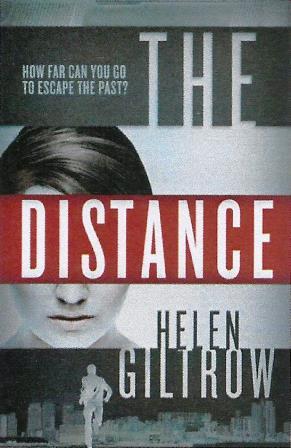
The Distance by Helen Giltrow coming in May is, according to publisher Orion: “A blistering debut thriller that introduces the coolest heroine in contemporary suspense fiction.” The heroine in question, Charlotte Alton, seems to be a specialist in hacking information and creating false identities, which certainly has contemporary ring to it. I am not sure yet (as I haven’t read it) of the setting but a tense Prologue appears to have the narrator in a prison cell guarded by a ‘WPC’ which might suggest a timeframe of a few years ago as I believe (though could be wrong) the rank of Woman Police Constable was abandoned in 1999.
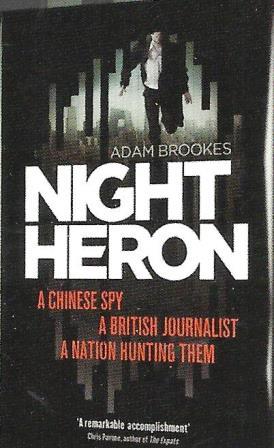
Little, Brown’s “biggest thriller debut of 2014” (also in May) is Night Heron by former BBC China correspondent Adam Brookes which the publisher says “does for twenty-first-century China what Child 44 did for post-war Russia” and will appeal to “readers of big buzz books like I Am Pilgrim”. Whilst neither of the titles it is compared to caused much of a buzz with me, I will certainly give Night Heron a go as decent spy thrillers involving China are relatively few and far between.
When they come off, however, they tend to be pretty good. John Le Carré’s The Honourable Schoolboy being the prime case in point, but I remember liking Joe Poyer’s 1973 bestseller The Chinese Agenda very much and greatly admiring Charles Cumming’s 2008 thriller Typhoon.
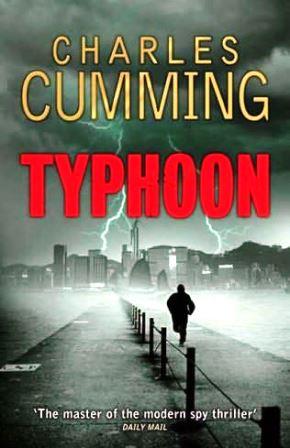 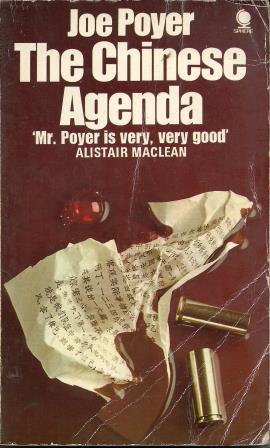
I am sure it is with all due respect to Helen Giltrow and her “blistering debut” that her publisher Orion claims that “2014’s most exciting debut ” will be The Killing Season by Mason Cross.
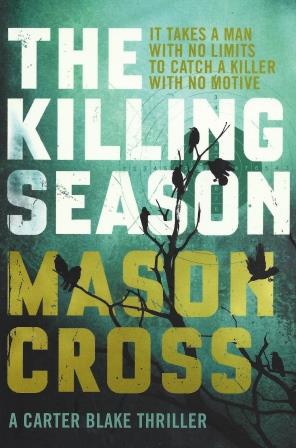
Set in America and involving a villain nicknamed ‘the Chicago Sniper’, the FBI, a hero who may or may not be called Carter Blake (no relation to Carter Brown the pulp fiction writer), a special agent called Banner (no relation to Bruce I hope) and an author called Mason (not Alex) Cross, it might come as a surprise to find that The Killing Season is written by a Scot who lives in Glasgow.
Proof copies carry very glowing testimonials from Jon Wood, Andrew Taylor (no, not that one), Louisa MacPherson, Hannah Lewis, Jemima Forrester, Graeme Williams, Federica Leonardis, Marissa Hussey and Jessica Purdue, who all, as it happens, work for Orion Publishing…
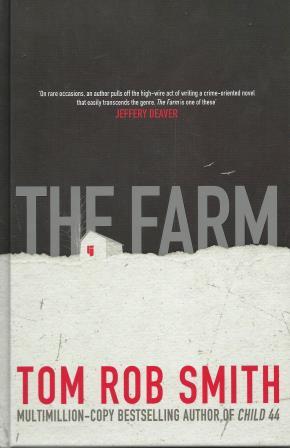
For legal reasons I have never seen a previous Tom Rob Smith novel and have missed out on his bestselling ‘Child 44’ Russian trilogy (the film of Child 44 is due out this year starring Tom Hardy and Gary Oldman), but I have been sent his new novel, The Farm, coming from Simon & Schuster this month.
This seems to be something of a departure for the author: a psychological thriller set in Sweden around a mother/son relationship which may or may not have anything to do with Tom Rob Smith having a Swedish mother.
Three Wise Men
Rather like the Royal Family, Professor Barry Forshaw, that urbane cosmopolitan Mr Peter Guttridge and myself never tempt fate by travelling on the same aircraft. We were, however, caught together in a rare photograph recently whilst involved in a preliminary rehearsal for the panel discussion we are to present at this year’s Crimefest, which may just be the only time the three of us will have appeared (sober) on the same stage together.
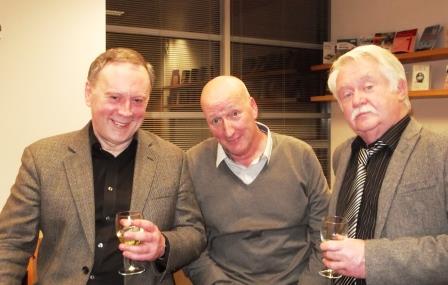
I have to say that rehearsal did not get very far as Professor Forshaw is contractually obliged, by a minor clause in the Danelaw, to mention Scandinavian crime fiction every fifteen minutes. Consequently, proceedings were interrupted whilst we admired the Nordic Noir supplement to the ‘Radio Times’ (no, I didn’t know it was still going either) which featured an interview with a blonde actress of Scandinavian origin for whom Professor Forshaw seemed to have the highest regard.
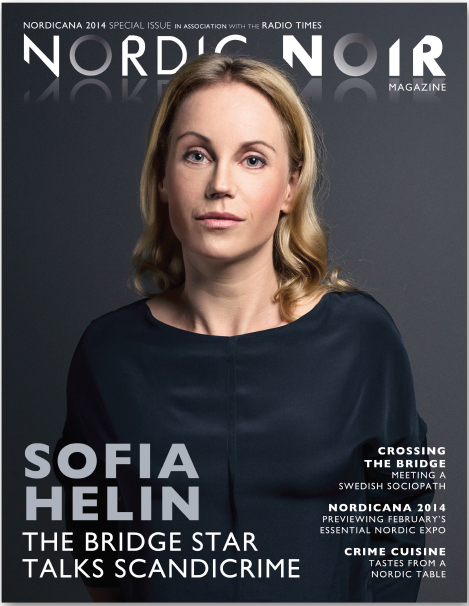
Intrigued by the supplement I discovered the following ruthlessly accurate analysis of the television drama known as The Bridge (or perhaps The Tunnel?) at http://www.youtube.com/watch?v=DodQ85QWREA
Cowboy Editors
Although he rarely appears like this in public, this is how Editor Mike ‘Sixgun’ Stotter normally dresses when attending editorial conferences in the Shots Magazine offices.
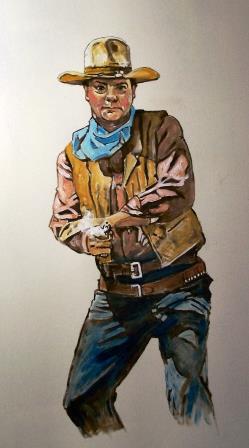
Needless to say, editorial dispute are settled rather swiftly.
Pip! Pip!
The Ripster
|